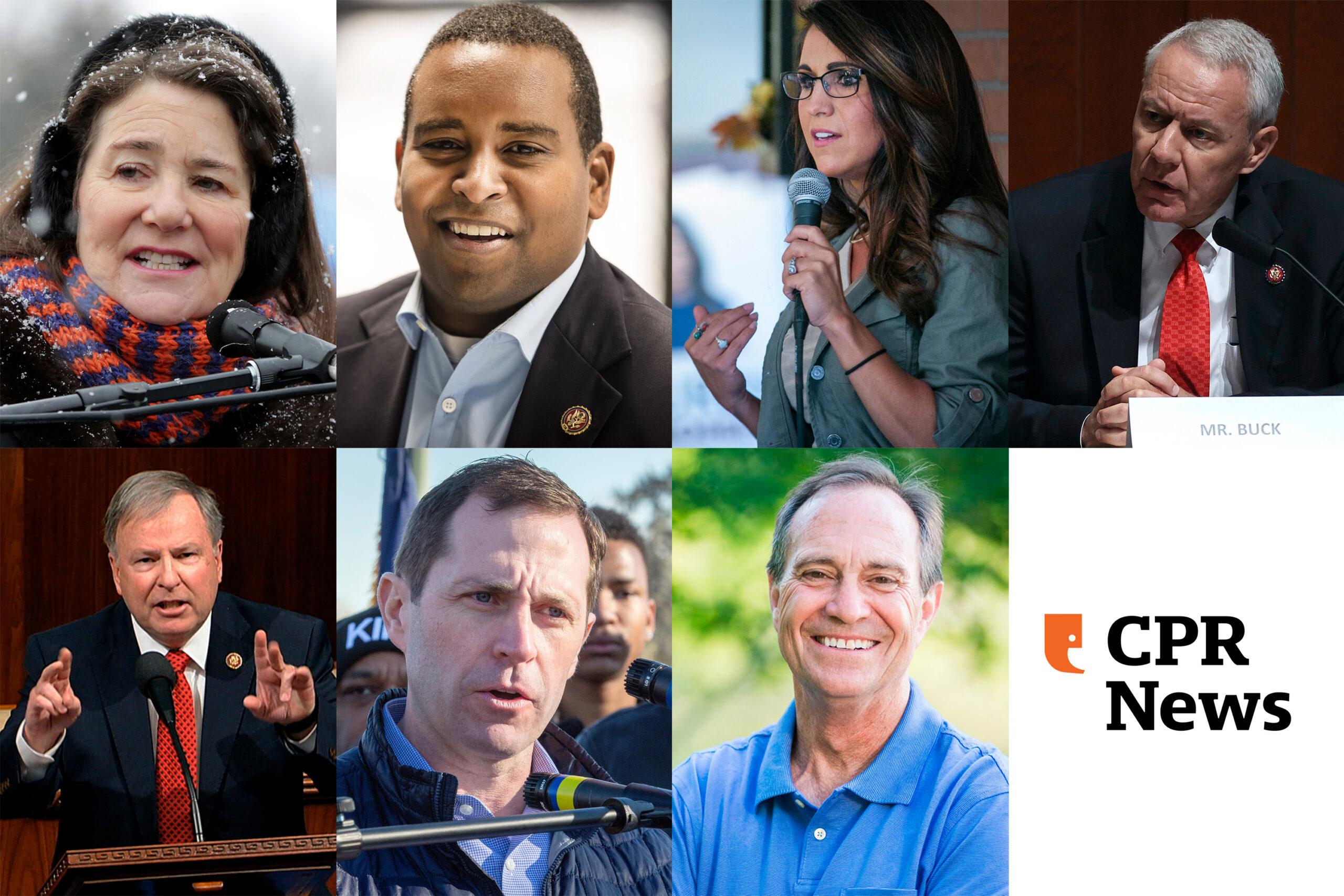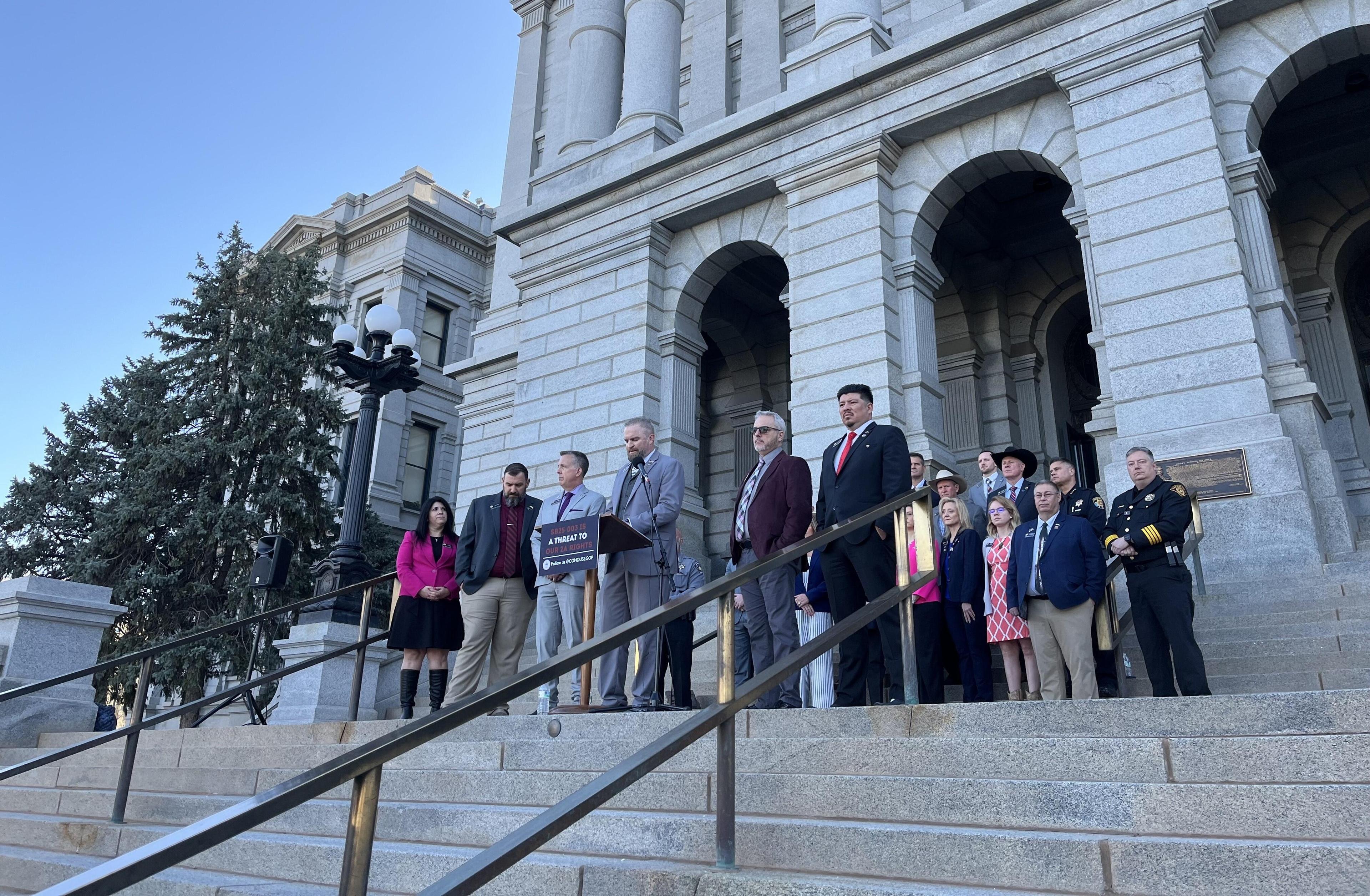
The 117th Congress has wrapped up its business, and the 118th — which will include two new members from Colorado — is on the cusp of being sworn in.
Looking back on the last two years of lawmaking, of the 6,346 pieces of legislation introduced in the Senate, 135 became law. On the other side of the Capitol, 11,450 bills were introduced in the House while 194 got signed into law.
Many more got through by being incorporated into larger must-pass bills, rather than as standalone legislation.
Looking at the bills lawmakers introduce — and their fates — can give constituents insight into their legislative priorities, their ability to build support and an idea of what they might reintroduce in the next congress.
The topics are influenced by a variety of factors: what constituents want, which issues are important to the lawmaker, the news of the moment, and what they hear and learn in their committees.
The next step — moving that bill forward — can depend on a host of other factors, like whether your party is in the majority or not, a lawmaker’s ability to draw support from both sides of the aisle or their chamber’s leadership or even the other chamber, and a dash of luck thrown in.
Here’s a look back at the bills Colorado’s delegation ran in the 117th Congress, and how they fared.
What Colorado’s senators did:
Sen. Michael Bennet
Democrat Michael Bennet, Colorado’s senior senator, introduced 51 pieces of legislation in the 117th Congress, submitted 43 amendments and co-sponsored 401 bills and amendments.
Most of his bills focused on health issues (10), public lands & natural resources (8) and taxation (8).
Many of Bennet’s bills were Colorado specific, most notably the Colorado Outdoor and Recreation Economy (CORE) Act. He’s supported the elements of that bill for years, but has had little luck getting it through the Senate. Instead, he finally saw some portions enacted through executive order this year.
He had more success with the Amache National Historic Site Act, which President Biden signed into law in March.
Other Colorado-centric bills from Bennet included the Dolores River National Conservation Area and Special Management Area Act, Ski Hill Resources for Economic Development, and the Colorado Judgeship Act, to name a few.
His other bills ranged from Medicare-X Choice Act to the HUBS for Veterans Act, which helps military members transition to civilian life.
One of the bills Bennet introduced during the so-called lame duck session after the election went nowhere, but sets up a marker for his priorities in the next Congress: a measure to reform the H-2A farm worker visa program. Bennet argues the reforms represent “last, best chance to save family farms,” while providing a pathway to citizenship for long term agricultural workers.
But whatever else Bennet hopes to do in the next congress, there is one bill that will take up a lot of his time: the 2023 Farm Bill. Bennet, who serves on the Agriculture Committee, has already held several listening sessions across the state to get input from Colorado communities.
Not surprisingly, Bennet’s most frequent senate co-sponsor was fellow Colorado senator John Hickenlooper, followed by Democratic Sens. Martin Heinrich of New Mexico and Cory Booker of New Jersey. On the other side of the aisle, he collaborated most frequently with Sens. Susan Collins of Maine and Rob Portman of Ohio. In total, 22 Republicans signed on as sponsors of one or another of Bennet’s bills.
When it came to working with the House, the majority of his bills had a companion measure, with just over 10 lacking a House version. Introducing the same bill in both chambers is an indication of both its support and its potential to advance.
While none of Bennet’s bills passed as a standalone this Congress (it was the House version of the Amache bill that made it to the president’s desk), some were incorporated into larger legislative packages — the Joint Chiefs Landscape Restoration Partnership Act was added to the infrastructure bill and the Relief for Ukraine Act found a home in the omnibus bill. That bill also funded National Heritage Areas, something Bennet tried to do through his Colorado National Heritage Areas Reauthorization Act.

Sen. John Hickenlooper
Democratic Sen. John Hickenlooper spent his first two years in federal office introducing 46 pieces of legislation: 27 bills and 19 amendments, while cosponsoring another 255.
His bills tended to reflect his committee assignments, with three dealing with commerce, three with energy, three with public lands and natural resources, and three on science, technology and communications. He also offered up some Colorado specific legislation, such as the Upper Colorado and San Juan River Basins Recovery Act and the Dearfield Study Act.
Hickenlooper’s most frequent Republican cosponsor was fellow Westerner and freshman Sen. Cynthia Lummis of Wyoming. In total, he attracted 12 Republican cosponsors to his different bills. More than half of his bills had companion measures in the House.
The freshman senator saw some of his bills make it to law through larger pieces of legislation, such as his COMPETES Act which hitched a ride in the Inflation Reduction Act or his RECHARGE Act, which was part of the infrastructure bill.
As for bills to be on the lookout for next Congress, in December Hickenlooper introduced both the Retirement Savings for Americans Act and the PREPARE Act, to set up a commission to study federal regulation of cannabis. Another bill to watch is Hickenlooper’s ORBITS Act to clear space junk. It passed the Senate in the last week of session and was sent to the House, where it ran out of time.
What Colorado’s representatives did:
Rep. Joe Neguse
It was some of the newest members of the Colorado delegation that continued to offer up the most bills in the 117th Congress.
Second term Democratic Rep. Joe Neguse introduced the most bills of Colorado’s House members this Congress, clocking in at 103 — 89 bills, 10 resolutions, and 4 amendments, with three of them passing as standalone pieces of legislation. But like other lawmakers, he had more success with larger pieces of legislation. For example, his Merger Filing Fee Modernization Act passed as part of the omnibus and the Secure Rural Schools Reauthorization act was included in the infrastructure bill.
The topics of Neguse’s bills covered the gamut, but the main subjects included armed forces and national security (including climate resilience and veterans issues), public lands, crime and law enforcement and government operations and politics. In addition to serving on the Judiciary and Rules committees and the Select Committee on the Climate Crisis, he was the chair of the House Natural Resources Committee subcommittee on National Parks, Forests and Public Lands.
He sponsored several bills directly impacting the state, including the CORE Act, the Upper Colorado and San Juan River Basins Recovery Act, the Wildfire Recovery Act and the Amache National Historic Site Act.
Neguse managed to get every member of the House delegation as a cosponsor of one or another of his bills, from Rep. Diana DeGette (14) to Rep. Lauren Boebert (3). He also cosponsored close to 750 pieces of legislation, including 13 of fellow Democrat Jason Crow’s bills and, on the Republican side, three of Ken Buck’s bills. Overall, he was able to get more than 50 Republicans to cosponsor one of his bills.
Whether he will be as prolific in the next Congress remains to be seen. While Democrats will no longer be in the majority, Neguse has risen in the ranks of the party’s House leadership, where he will be chair of the Democrats’ messaging arm. Still, among the bills he may reintroduce next congress is one to place a women’s suffrage monument, an idea from a Loveland artist, on the National Mall.
Rep. Jason Crow
In this last Congress Rep. Jason Crow introduced 54 pieces of legislation — 52 bills and 2 resolutions, with three becoming law on their own. He co-sponsored a total of 475 bills.
Among the bills he introduced with a Colorado bent are the Space National Guard Establishment Act, cosponsored with GOP Rep. Doug Lamborn, and a bill to close the loophole on Interstate Firearm Sales Act, after a Florida woman reportedly obsessed with the Columbine massacre was able to complete suicide with a shotgun she purchased shortly after landing in Colorado.
Not surprisingly for Crow, a former Army Ranger who sits on the Armed Services and Intelligence committees, most of his bills had a military or national security bent. The other main topics of his bills included commerce (he is also on the Small Business Committee), health and immigration.
His bill for a Congressional Gold Medal for World War II US Army Rangers Veterans had more than 300 cosponsors in the House (but it was the Senate companion bill that got signed into law), while his Global War on Terrorism Memorial Location Act has more than 200. He’s gotten more than 150 Republicans to cosponsor one of his bills, including Buck and Lamborn.
Crow also had some measures, such as provisions to help Afghan Special Immigrant Visa holders, pass in larger bills.
One bill you can expect him to push again in the upcoming congress is the Space Force National Guard bill; Colorado is home to a large percentage of the National Guard members currently assigned to space missions and Crow and his co-sponsor Lamborn argue it makes sense to create a dedicated reserve counterpart for Space Force.
Rep. Lauren Boebert
Freshman Republican Lauren Boebert introduced 31 bills and 10 resolutions in her first term in office, while cosponsoring 332.
Five of her bills dealt with immigration issues and three with public lands (She’s a member of the Natural Resources committee). When it comes to Colorado-specific issues, she introduced a bill to keep the headquarters of the Bureau of Land Management in Grand Junction (The Interior Dep’t did move it back to Washington, D.C., but kept Grand Junction as a Western headquarters), as well as the House version of the Dolores River land bill and a bill to set up a zip code for Silver Cliff, Colorado.
Perhaps in keeping with her combative public persona, much of what Boebert introduced served more as messaging bills than legislation she had any hope of passing. Those included prohibiting action to meet the goals of the Paris Climate Accord, Stop AOC Act (which had nothing to do with the NY Democratic lawmaker, but rather stood for Stop Appropriations for Obsequy Costs Act, which would end a federal program that helps cover the cost of funerals for people who die of COVID) and a few anti-trans bills, such as one to prohibit the use of federal funds for research or publications regarding gender transition for those 18 and younger.
Her effort to end the Disinformation Governance Board garnered her the most cosponsors of any of her bills, at 81, but most of her proposals had less than 40 cosponsors. Boebert was the only member of the delegation not to get a single bipartisan cosponsor on any of her bills, particularly notable given that she was serving in the minority.
None of Boebert’s bills or resolutions (which included measures to impeach President Joe Biden and Vice President Kamala Harris) advanced in the House. A discharge petition was submitted in April 2021, for her Protecting American Energy Jobs bill. It needed 218 signatures to force a full House vote, but only got 82.
Rep. Ken Buck
GOP Rep. Ken Buck introduced 21 bills and four resolutions, while co-sponsoring 251 pieces of legislation.
The former district attorney, who sits on the Judiciary and the Foreign Affairs committees, introduced five bills on crime and law enforcement and three dealing with international affairs. One of his bills, the State Antitrust Enforcement Venue Act, started collecting signatures for a discharge petition in January, 2022, but only had 107 signers by the end of session.
Most of his bills had 40 cosponsors or fewer. Stil Buck’s bills gained him more than a dozen Democratic cosponsors, including progressive Democrats on some of his antitrust bills. Of the Colorado delegation, GOP Rep. Doug Lamborn was his most frequent cosponsor, with six bills, followed by Neguse with three.
Buck’s Dearfield Study Act was passed as part of the omnibus bill, as was the Senate version of a House bill he introduced to ban TikTok on government devices.
Rep. Diana DeGette
The dean of the Colorado Delegation, Rep. Diana DeGette, introduced 18 pieces of legislation this congress, 16 of them bills. She cosponsored over 500. DeGette was also chair of the House Energy and Commerce Committee’s Oversight and Investigations subcommittee.
Most of her bills focused on health (7) followed by environmental protection (3), crime and law enforcement (3) and energy (3).
A few of her bills have drawn more than 100 cosponsors, with her fellow Coloradan House Democrats among them. Various of her bills have also garnered the support of more than 40 House Republicans, none of them from Colorado.
Elements of DeGette’s CURES 2.0 legislation, which she worked on with GOP Rep. Fred Upton, were included in the omnibus, including setting up a new Advanced Research Projects Agency for Health, ARPA-H.
As for bills that might be on the docket for the 118th, DeGette’s Colorado wilderness bill once again passed the House this Congress, but has had no luck in the Senate. It’s a bill she’s reintroduced in the chamber several times, although is unlikely to advance in a Republican-controlled House. Her bill on reducing methane emissions, which she’s introduced before, passed out of committee, but was not taken up by the full chamber.
Rep. Ed Perlmutter
In his last session in office, Rep. Ed Perlmutter introduced 14 pieces of legislation (and also four debate rules resolutions) and cosponsored 348.
Most of his bills revolved around finance and the financial sector, as well as government operations and politics. He may be gone, but one bill that many expect to be picked up by another sponsor in the 118th congress is the SAFE Banking bill, which would give cannabis companies access to financial services.
Rep. Doug Lamborn
The delegation’s longest-serving Republican, Doug Lamborn, introduced 12 pieces of legislation — nine bills and three resolutions. Lamborn sits on the Armed Services Committee, where he’s in line to chair the Strategic Forces subcommittee, as well as the Natural Resources Committee. Most of his bills have focused on communications and national security, as well as cultural issues.
The first bill he introduced this Congress was the Second Chance at Life Act, which would require medical providers to give information about reversing a medication abortion, a procedure the American College of Obstetricians and Gynecologists calls “unproven and unethical.” It was also his bill with the most cosponsors, at 64. The staunchly anti-abortion lawmaker also introduced a bill that would prevent the Department of Health and Human Services from providing funds to states that permit abortions (like Colorado) or facilitate travel for abortions and the Recognizing the Unborn Act.
Lamborn’s bills didn’t attract much support from the rest of the delegation. Fellow Republican Lauren Boebert was a cosponsor for four of them, while Democratic Rep. Joe Neguse was a cosponsor for one.
The last bill Lambon introduced in this congress, to protect kids from fentanyl, was one of his few bills to attract bipartisan support, including from Neguse.
In the next Congress, Lamborn will likely continue to work with Crow to get a Space Force National Guard and Reserve.









